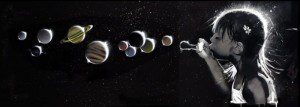I first stumbled upon the term Perennialism in Aldous Huxley’s lovely book the Perennial Philosophy, published three years before I was born. And, for me in my youth searching for an intellectually honest, which meant to me not obviously conflicting with the natural world, this book together with Richard Maurice Bucke’s Cosmic Consciousness, and William James’ Varieties of Religious Experience outlined the general direction for my quest for meaning and purpose in life.
Now, in practice I have a complicated relationship with Perennialism. On the one hand I think it points in the right direction broadly when it suggests there are truths that each religion touch. This insight is a big reason I would eventually find myself a Unitarian Universalist. On the other hand it seems pretty obvious to me that there is not a single mountain and that all religions are following their separate paths up to the same summit. Lots of different mountains. Some are more useful than others. Which is probably why Zen Buddhism and its disciplines remains the core of my actual interior life.
For me the best example of the problems with Perennialism is Huston Smith’s Religions of Man, first published in 1958. For many years those of us interested in the World’s Religions found it offered our first glimpses into the richness that are the world spiritualities. For good reason it has continued in print for years, and even today with the more inclusive re-titling the World’s Religions, has all together sold over two million copies.
What the author doesn’t tell folk is that he is a full on Traditionalist, a form of Perennialism that I find attractive, but which has some serious problems trying to crowbar all the religions into the same basic camp. So, his book, which is admirable in so many ways, when it comes to Buddhism just has a terrible time, where he believes down to the soles of his feet that there is a true religion under all religions and that it is grounded in a mystical theism. And so the chapter on Buddhism is deeply marred by his, to my mind, desperate reach for theistic elements in Buddhism and trying to make them the normative expression of the tradition.
(I’m less bothered by, but also warned by how Traditionalism itself with its focus on holding fast to received traditions has been neatly incorporated into some photo-fascistic political philosophies. But, that’s noted for another reflection…)
At this point in my life the issue is this. I believe there are currents of religion that are rooted in our biology, and as something natural, also something that people can find within all religions. And I hope it would therefore be obvious also available without any religion at all.
There are a number of these currents, some go toward ethics – what I see as an innate sense of the “fair,” a sense that things should be harmonious, what is good for the goose is good for the gander kind of photo-morality confusingly coupled with a deeply held desire to get one up, and with that an inclination to cheat. I believe pretty much all religious ethics arise out of these two things existing in tension.
Rather more important is what is it at the root of the mystical, and by mystical I mean quite narrowly an apprehension of a root to all our individual consciousnesses. For most of the world’s religions this root is seen as God, and as profoundly personal. But Buddhism shows this does not have to be experienced that way. And, for me, points again to our biology. We seem to have within the structures of our brains an ability to see at the same time that we are different and distinct and acting in our own interests, that there is a common place, we exist within an intimacy so profound it is fair to call it one.
I believe the Buddhist explanation, particularly the Zen Buddhist explanation, and more specifically the “modernist” Zen Buddhist explanation (here I’m thinking of an emerging literature led first by Alan Watt’s various writings, but today more aligned with Stephen Batchelor’s Buddhism Without Beliefs, Robert Aitken’s Mind of Clover, and John Tarrant’s the Light Inside the Dark, and perhaps summarized within my own If You’re Lucky, Your Heart Will Break. Throw in the various books by James Austin following his Zen and the Brain what you see is naturalistic, often poetic, of necessity poetic, cut through with a concern for ethics, but always, always grounded in that common human encounter with our fundamental reality – which is both one and many.
A work in progress.
No doubt.













